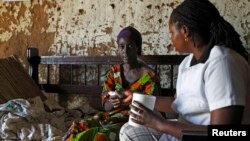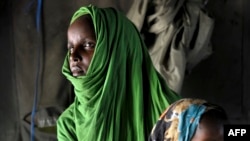ADDIS ABABA —
African countries face a $7-billion funding gap to control and eliminate malaria. To discuss this issue among others, African ministers of health came together at the African Union headquarters to commemorate World Malaria Day.
Every year 660,000 people die from malaria, and 90 percent of those deaths are in Africa. Eliminating malaria by 2015 is one of the United Nations' Millennium Development Goals. But an estimated $26.9 billion is needed in the next three years to reach the goal.
African Union Commissioner for Social Affairs Mustapha Kaloko says funding is the main challenge, when it comes to fighting malaria.
"We Africans must create [an] innovative domestic national health financing model. We cannot and should not continue to rely on external funding for health. The experience of the last few years has shown that external funding are neither predictable nor assured," he said.
Malaria costs Africa $12 billion each year in lost productivity, alone. And, a recent study conducted by the Mckinsey global consultancy company notes that every dollar invested in malaria control in Africa, generates an estimated $40 dollar in gross domestic product. But, African countries receive about 75 percent of their budget for malaria control from abroad.
Fatoumata Nafo-Traore, executive director of the Roll Back Malaria Partnership, says African countries could become less dependent, if they would prioritize malaria control:
"Malaria should come among the priorities," she said. "If that is the case then it would become easy really to find the resources within the government budget. Malaria control interventions are not very expensive. Rapid diagnosis tests costs 50 cents and the treatment for a child costs lest than a dollar. Also, bed nets will costs between $3 to $6. If you bring all these three together, it's less than $10 to cover one person."
In addition to becoming less dependent on aid to pay for malaria prevention, Petrina Haingura of the Namibian Ministry of Health advises African governments to make better use of the resources that are available. She says that resources are distributed in communities, without proper education:
"We need to make them aware of these problems of malaria. And, also, some communities are using this mosquito nets by using it to catch fish. But I think we need to emphasize why we are giving them these mosquito nets is to prevent malaria," she said.
Malaria deaths have decreased to an average of about 33 percent on the African continent. But scientists expect that shortages in funding for control interventions could quickly turn around those results.
African ministers of health are in a four-day conference of the African Union where the call to fight malaria has been renewed.
Every year 660,000 people die from malaria, and 90 percent of those deaths are in Africa. Eliminating malaria by 2015 is one of the United Nations' Millennium Development Goals. But an estimated $26.9 billion is needed in the next three years to reach the goal.
African Union Commissioner for Social Affairs Mustapha Kaloko says funding is the main challenge, when it comes to fighting malaria.
"We Africans must create [an] innovative domestic national health financing model. We cannot and should not continue to rely on external funding for health. The experience of the last few years has shown that external funding are neither predictable nor assured," he said.
Malaria costs Africa $12 billion each year in lost productivity, alone. And, a recent study conducted by the Mckinsey global consultancy company notes that every dollar invested in malaria control in Africa, generates an estimated $40 dollar in gross domestic product. But, African countries receive about 75 percent of their budget for malaria control from abroad.
Fatoumata Nafo-Traore, executive director of the Roll Back Malaria Partnership, says African countries could become less dependent, if they would prioritize malaria control:
"Malaria should come among the priorities," she said. "If that is the case then it would become easy really to find the resources within the government budget. Malaria control interventions are not very expensive. Rapid diagnosis tests costs 50 cents and the treatment for a child costs lest than a dollar. Also, bed nets will costs between $3 to $6. If you bring all these three together, it's less than $10 to cover one person."
In addition to becoming less dependent on aid to pay for malaria prevention, Petrina Haingura of the Namibian Ministry of Health advises African governments to make better use of the resources that are available. She says that resources are distributed in communities, without proper education:
"We need to make them aware of these problems of malaria. And, also, some communities are using this mosquito nets by using it to catch fish. But I think we need to emphasize why we are giving them these mosquito nets is to prevent malaria," she said.
Malaria deaths have decreased to an average of about 33 percent on the African continent. But scientists expect that shortages in funding for control interventions could quickly turn around those results.
African ministers of health are in a four-day conference of the African Union where the call to fight malaria has been renewed.





